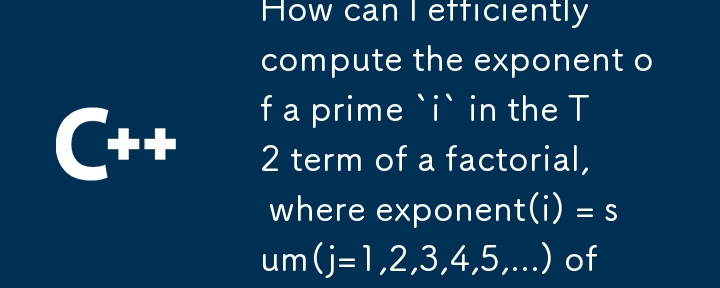
질문의 문제는 빠르고 정확한 bigint 계승에 대한 표현식에서 T2 항을 계산하는 빠른 방법을 찾는 것입니다. T2 용어는 다음과 같이 정의됩니다.
T2(4N) = multiplication(i=all primes<=4N) of [i^sum(j=1,2,3,4,5,...4N>=i^j) of [(4N/(i^j))%2]]
이것은 이미 매우 빠르며 일부 프로그래밍 트릭을 사용하면 복잡성이 ~ O(log(n))에 가까워집니다.
분명히 말하자면, 현재 구현은 다음과 같습니다:
longnum fact(const DWORD &x,longnum &h) // h return (x>>1)! to speed up computation
{
if (x==0) { h=1; return 1; }
if (x==1) { h=1; return 1; }
if (x==2) { h=1; return 2; }
if (x==3) { h=1; return 6; }
if (x==4) { h=2; return 24; }
int N4,N2,N,i; longnum c,q;
N=(x>>2);
N2=N<<1;
N4=N<<2;
h=fact(N2,q); // get 2N! and N!
c=h*h; for (i=(N2+1)|1;i<=N4;i+=2) c*=i; c/=q; // c= ((2N)!).((2N)!)/ N!
for (i=N4+1;i<=x;i++) c*=i; c.round(); c<<=N ; // convert 4N! -> x!, cut off precision losses
for (i=(N2+1)|1,N2=x>>1;i<=N2;i++) h*=i; h.round(); // convert 2N! -> (x/2)!, cut off precision losses
return c;
}longnumfact(const DWORD &x)
{
longnum tmp;
return fact(x,tmp);
}Now my question: Is there a fast way to obtain N! from this T2 **term**:
T2 = (4N)! /(((2N)!).((2N)!))
so:
(4N)! = (((2N)!).((2N)!)).T2
This would help a lot because then it would not be needed to compute .../(N!) for factorial. The T2 term is always integer-decomposable to this:
T2 = T2 * N!
Finally, it hit me :) I have done a little program for primes decomposition of factorials and then suddenly all becomes much clearer:
4! = 2!.2!.(2^1).(3^1) = 24
8! = 4!.4!.(2^1).(5^1).(7^1) = 40320
12! = 6!.6!.(2^2).(3^1).(7^1).(11^1) = 479001600
16! = 8!.8!.(2^1).(3^2).(5^1).(11^1).(13^1) = 20922789888000
20! = 10!.10!.(2^2).(11^1).(13^1).(17^1).(19^1) = 2432902008176640000
24! = 12!.12!.(2^2).(7^1).(13^1).(17^1).(19^1).(23^1) = 620448401733239439360000
28! = 14!.14!.(2^3).(3^3).(5^2).(17^1).(19^1).(23^1) = 304888344611713860501504000000
32! = 16!.16!.(2^1).(3^2).(5^1).(17^1).(19^1).(23^1).(29^1).( 31^1) = 263130836933693530167218012160000000
36! = 18!.18!.(2^2).(3^1).(5^2).(7^1).(11^1).(19^1).(23^1).( 29^1).(31^1) = 37199332678990121746799944815083520000000
40! = 20!.20!.(2^2).(3^2).(5^1).(7^1).(11^1).(13^1).(23^1).( 29^1).(31^1).(37^1) = 815915283247897734345611269596115894272000000000
After analyzing the prime exponents of the T2 term (the rest after half factorials ^ 2) I derive the formula for them:
T2(4N) = 곱셈(i=2,3,5,7,11,13,17,...) of ( i ^ sum(j=1,2,3) ,4,5,...) (4N/(i^j))-(2N/(i^j)) )
The problem is that the divisions 4N/(i^j) and 2N/(i^j) must be done in integer math so they cannot be simplified easily. So I have another question: How can I compute this: exponent(i) = sum(j=1,2,3,4,5,...) of (N/(i^j)) effectively?
위 내용은 지수(i) = sum(j=1,2,3,4,5,...) of (4N/( i^j)) - (2N/(i^j))?의 상세 내용입니다. 자세한 내용은 PHP 중국어 웹사이트의 기타 관련 기사를 참조하세요!